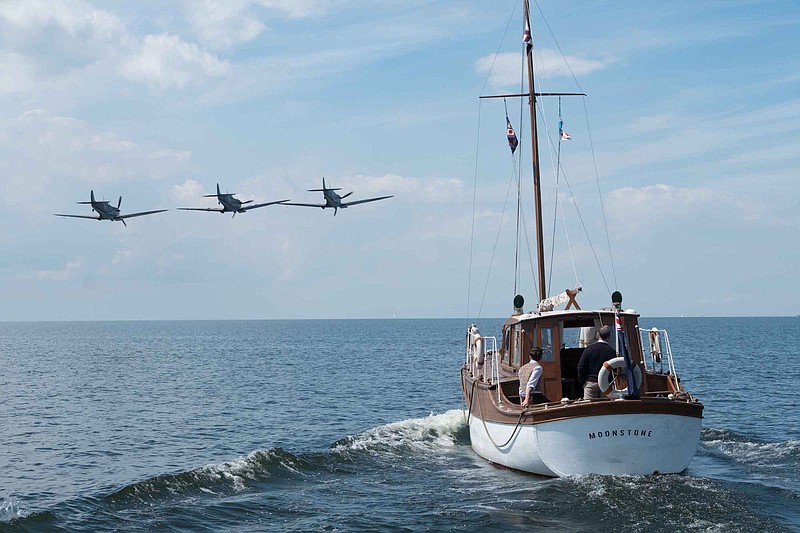Despite often introspective Americans' thoughts to the contrary, World War II did not begin when the Japanese bombed Pearl Harbor on Dec. 7, 1941.
Baby boomers, their children and their grandchildren may believe the movies "Patton," "Saving Private Ryan" and "Pearl Harbor" give them all the history they need to know about the war, now 72 years in the rear-view mirror. But the fight to save Europe from Nazism dates back more than two years before the United States' rendezvous with destiny in Hawaii. You could look it up.
A critical moment in that fight took place in and around the French port of Dunkirk in the northeastern tip of the country in late May and early June 1940. British and French troops there were fighting off the advancing Germans, who already had trampled through the Netherlands and Belgium and forced those countries to surrender.
What happened in northern France, though, was not the same kind of scenario as Allied troops storming the cliffs at Normandy, raising the flag at Iwo Jima or surviving the Battle of the Bulge.
It was a retreat - but a retreat and a rescue and a standoff that allowed the British and French to fight another day and have the confidence to do so.
It is the subject of the 2017 film "Dunkirk," which received rave reviews and is being touted for upcoming Academy Award nominations.
In conjunction with Veterans Day, the Tennessee Aquarium IMAX Theater will screen the movie - 70 percent of which was shot on IMAX film - for three weekends. Part of the purchase price of each ticket will be donated to the capital campaign of the Charles H. Coolidge Medal of Honor Heritage Center, which is raising funds for a headquarters at the Aquarium Plaza.
On opening night on Friday, retired U.S. Navy Rear Admiral Noah Long, a member of the Medal of Honor Heritage Center board of trustees, will introduce the film, and the theater's lobby will be filled with artifacts (1940s military equipment and actual Medals of Honor, among other things) from the center.
Retired U.S. Army Maj. Gen. Bill Raines, chairman of the center's board of trustees, said some of the items on display may help people understand aspects of the Dunkirk story.
"Every artifact on display has a story behind it - a story that will provide people with a personal connection to this harrowing tale of survival and resistance and a better understanding of the heroic actions that happened in Dunkirk, France, and throughout World War II," he said in a news release.
Indeed, there is much to tell in the actual story, which is one of courage, sacrifice and a bit of good fortune.
If we pick up the saga on May 25, 1940, according to the 1990 book "Pillar of Fire: Dunkirk 1940," American journalist William Shirer wrote: "German military circles here tonight put it flatly. They said the fate of the great Allied army bottled up in Flanders is sealed."
Unbeknown to the journalist, though, German Chancellor Adolf Hitler, perhaps thinking the nearly surrounded troops were all but defeated, perhaps wanting to have his troops resupplied, perhaps believing his air power was sufficient should the troops try to evacuate, had halted his army's advance.
By the time the halt - called "one of the great turning points of the war" - was rescinded, the British Royal Navy had put into operation a plan to rescue the troops. Its naval vessels were too heavy to reach the shallow beaches, but the country's appeal for assistance from smaller civilian craft had been answered promptly and bravely. When operations concluded, nearly 400 "little ships" (leisure and fishing craft and ferries) had participated in the dangerous effort of crossing the English Channel.
As the rescue operation unfolded, in an endeavor critics said the new movie doesn't emphasize enough, cutoff French troops kept the invading Germans occupied. In fact, they held them off until late May, when some 35,000 starving soldiers had to surrender.
In the end, more than 330,000 troops - mostly British - were evacuated from the French coast. Had the British had to surrender those troops, newly installed British Prime Minister Winston Churchill might have been forced to make peace with Germany's Adolf Hitler, and the rest of Europe may have fallen unchallenged.
The indefatigable prime minister used the occasion, and the defense of their country they still would have to make, to rally his countrymen.
"We shall fight on the beaches," he said in the House of Commons, "we shall fight on the landing grounds, we shall fight in the fields and in the streets, we shall fight in the hills - we shall never surrender."
Yes, if you've heard the "never surrender" slogan before, that's the occasion on which it was made.
The values displayed by those in what became known as Operation Dynamo are not unlike the values - citizenship, commitment, courage, integrity, patriotism and sacrifice - said to be held by U.S. Medal of Honor recipients. It is only fitting, then, that this film and this burgeoning heritage center share the stage on a weekend in which we remember those who fought and continue to fight for our freedom.
